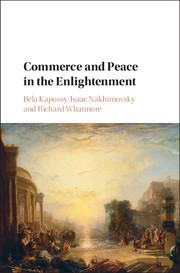46 results
12 - Revolution at Geneva: Genevans in Revolution
- from Part II - Western, Central, and Eastern Europe
-
-
- Book:
- The Cambridge History of the Age of Atlantic Revolutions
- Published online:
- 18 October 2023
- Print publication:
- 09 November 2023, pp 329-348
-
- Chapter
- Export citation
11 - Rengger, History, and the Future of International Relations
-
-
- Book:
- The Civil Condition in World Politics
- Published by:
- Bristol University Press
- Published online:
- 13 October 2022
- Print publication:
- 11 April 2022, pp 211-228
-
- Chapter
- Export citation
Mariana Saad, Cabanis. Comprendre l’homme pour changer le monde (Paris: Classiques Garnier, 2016), pp. 309, €37,00, hardback, ISBN: 9782406058038.
-
- Journal:
- Medical History / Volume 63 / Issue 1 / January 2019
- Published online by Cambridge University Press:
- 17 December 2018, pp. 103-104
-
- Article
-
- You have access
- HTML
- Export citation
7 - Gibbon and Republicanism
-
-
- Book:
- The Cambridge Companion to Edward Gibbon
- Published online:
- 01 June 2018
- Print publication:
- 21 June 2018, pp 128-146
-
- Chapter
- Export citation
Copyright page
-
- Book:
- Commerce and Peace in the Enlightenment
- Published online:
- 13 July 2017
- Print publication:
- 20 July 2017, pp iv-iv
-
- Chapter
- Export citation
Introduction
-
-
- Book:
- Commerce and Peace in the Enlightenment
- Published online:
- 13 July 2017
- Print publication:
- 20 July 2017, pp 1-19
-
- Chapter
- Export citation
Dedication
-
- Book:
- Commerce and Peace in the Enlightenment
- Published online:
- 13 July 2017
- Print publication:
- 20 July 2017, pp v-vi
-
- Chapter
- Export citation
Contributors
-
- Book:
- Commerce and Peace in the Enlightenment
- Published online:
- 13 July 2017
- Print publication:
- 20 July 2017, pp ix-xi
-
- Chapter
- Export citation
Index
-
- Book:
- Commerce and Peace in the Enlightenment
- Published online:
- 13 July 2017
- Print publication:
- 20 July 2017, pp 346-350
-
- Chapter
- Export citation
Acknowledgements
-
- Book:
- Commerce and Peace in the Enlightenment
- Published online:
- 13 July 2017
- Print publication:
- 20 July 2017, pp xii-xii
-
- Chapter
- Export citation
8 - Liberty, war and empire
-
-
- Book:
- Commerce and Peace in the Enlightenment
- Published online:
- 13 July 2017
- Print publication:
- 20 July 2017, pp 216-243
-
- Chapter
- Export citation
Contents
-
- Book:
- Commerce and Peace in the Enlightenment
- Published online:
- 13 July 2017
- Print publication:
- 20 July 2017, pp vii-viii
-
- Chapter
- Export citation

Commerce and Peace in the Enlightenment
-
- Published online:
- 13 July 2017
- Print publication:
- 20 July 2017
1 - ‘A lover of peace more than liberty’?
-
-
- Book:
- Engaging with Rousseau
- Published online:
- 05 July 2016
- Print publication:
- 28 July 2016, pp 1-16
-
- Chapter
- Export citation
THE ATTEMPTS TO TRANSFER THE GENEVAN ACADEMY TO IRELAND AND TO AMERICA, 1782–1795
-
- Journal:
- The Historical Journal / Volume 56 / Issue 2 / June 2013
- Published online by Cambridge University Press:
- 03 May 2013, pp. 345-368
- Print publication:
- June 2013
-
- Article
- Export citation
6 - Burke on Political Economy
-
-
- Book:
- The Cambridge Companion to Edmund Burke
- Published online:
- 05 December 2012
- Print publication:
- 22 October 2012, pp 80-91
-
- Chapter
- Export citation
Contributors
-
-
- Book:
- French Liberalism from Montesquieu to the Present Day
- Published online:
- 05 March 2012
- Print publication:
- 19 January 2012, pp vii-x
-
- Chapter
- Export citation
Chapter 10 - War, trade and empire: the dilemmas of French liberal political economy, 1780–1816
- from Part IV - Economic Liberalismà la française
-
-
- Book:
- French Liberalism from Montesquieu to the Present Day
- Published online:
- 05 March 2012
- Print publication:
- 19 January 2012, pp 169-191
-
- Chapter
- Export citation
12 - Shelburne and Perpetual Peace: Small States, Commerce, and International Relations within the Bowood Circle
- from Part Three - The Bowood Circle Revisited
-
-
- Book:
- An Enlightenment Statesman in Whig Britain
- Published by:
- Boydell & Brewer
- Published online:
- 05 September 2013
- Print publication:
- 15 September 2011, pp 249-274
-
- Chapter
- Export citation
ETIENNE DUMONT, THE BRITISH CONSTITUTION, AND THE FRENCH REVOLUTION
-
- Journal:
- The Historical Journal / Volume 50 / Issue 1 / March 2007
- Published online by Cambridge University Press:
- 13 February 2007, pp. 23-47
- Print publication:
- March 2007
-
- Article
- Export citation



